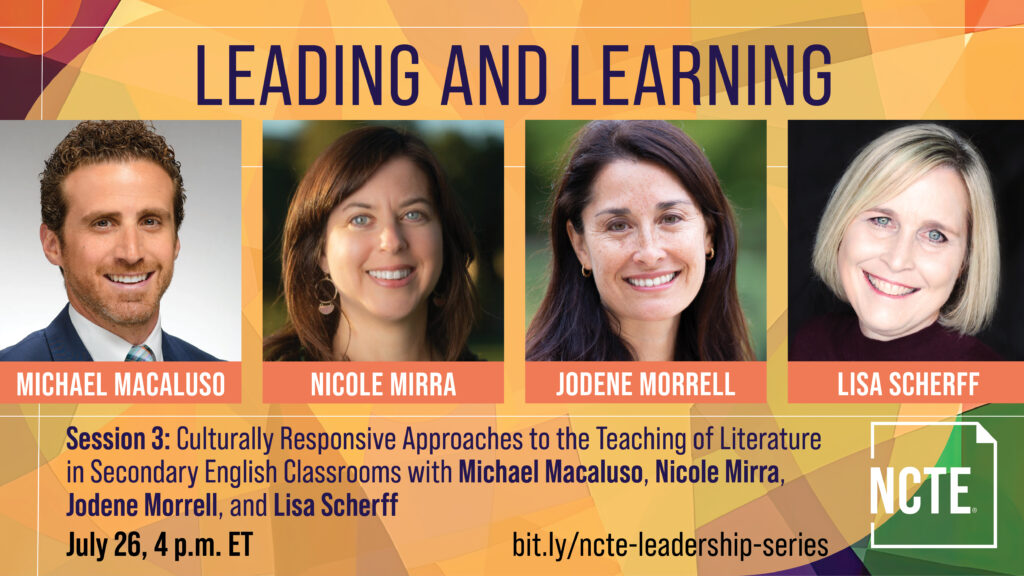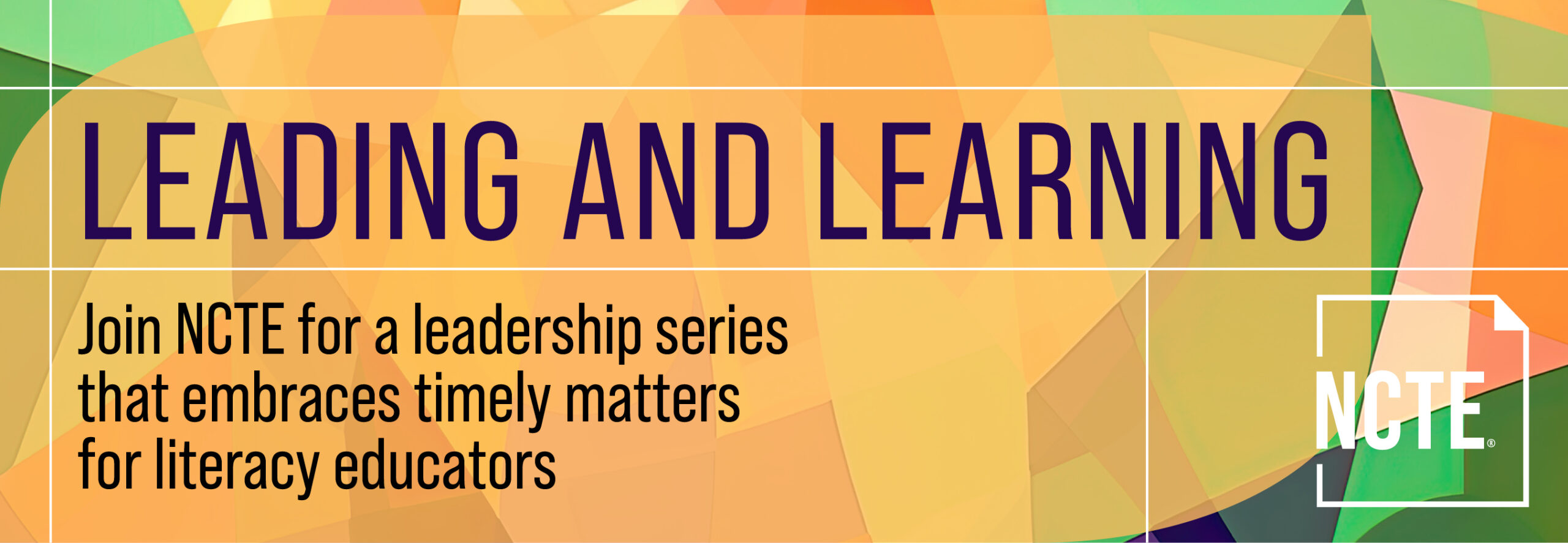
Attention all leaders and aspiring leaders! Join NCTE for a leadership series exploring a variety of timely topics from NCTE-affiliated experts in the field. This series will explore new policy briefs, share how to leverage literacy for advocacy purposes, and discuss issues that have been dominating the news cycle and are most top-of-mind for educators.
Leading and Learning: Culturally and Historically Responsive Literacies with Gholdy Muhammad
Wednesday, May 31, at 5 p.m. ET
This session will delve into the new NCTE James R. Squire Office brief Culturally and Historically Responsive Education by Gholdy Muhammad. In this talk, Muhammad offers a unique culturally and historically responsive approach toward the goal of cultivating genius, justice, and joy in education. This approach is essential for accelerating the growth of all students, and particularly youth of color, who traditionally have been underserved in learning standards, policies, and school practices. She will present her CHRL equity framework, called the HILL Model, to help educators teach toward developing students’ histories, identities, literacies, and liberation. The HILL Model consists of five pursuits in teaching and learning:
o Identity Development—Helping youth to make sense of who they are and understand others.
o Skill Development—Helping youth to develop proficiencies across the content areas and state learning standards.
o Intellectual Development—Helping youth to gain new knowledge that is set into the context of the world.
o Criticality—Helping youth to name, understand, question, and disrupt oppression in the world.
o Joy—Helping youth to uplift beauty, aesthetics, truth, and personal space fulfillment within humanity.
Participants will learn and understand history and policy as well as personal and instructional factors that justify the need and purpose for culturally and historically responsive literacy. Educators will be encouraged and motivated to be more inclusive in their teaching and policy of these five collective pursuits while learning the importance of integrating cultural, racial, linguistic, and historical responsiveness into their learning goals, lesson plans, and the texts they use to teach.
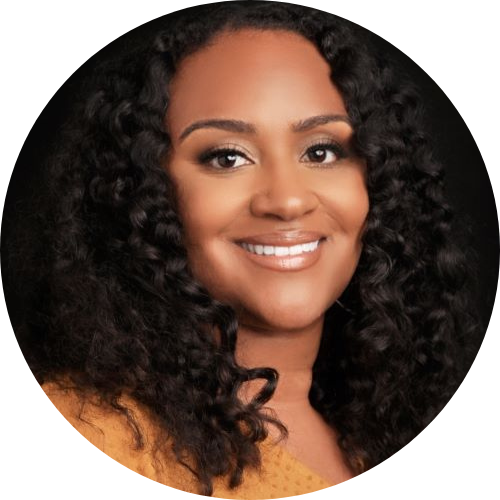
Gholnecsar (Gholdy) Muhammad is an associate professor of literacy, language, and culture at the University of Illinois at Chicago. She has previously served as a classroom teacher, literacy specialist, school district administrator, curriculum director, and school board president. She studies Black historical excellence in education, intending to reframe curriculum and instruction today. Dr. Muhammad’s scholarship has appeared in leading academic journals and books. She has also received numerous national awards and is the author of the bestselling book Cultivating Genius: An Equity Model for Culturally and Historically Responsive Literacy. She also coauthored Black Girls’ Literacies: An Edited Volume. Her Culturally and Historically Responsive Education model has been adopted across thousands of US schools and districts across Canada. In 2022 and 2023, she was named among the top 1% of Edu-Scholar Public Influencers due to her impact on policy and practice. She has also received numerous awards from national organizations and universities. She was awarded the American Educational Research Association Division K Early Career Award and was named the 2021 NCTE Outstanding Elementary Educator in the English Language Arts. She has led a federal grant with the United States Department of Education to study culturally and historically responsive literacy in STEM classrooms. Her new book, Unearthing Joy, is the sequel to Cultivating Genius and provides a practical guide for putting culturally and historically responsive education into curricular practice.

Leading and Learning: Session #2 based on Digital Platforms and the ELA Classroom, a new NCTE Squire Office Brief
Wednesday, July 19, at 4 p.m. ET
Digital platforms are a fundamental part of today’s English language arts classroom. Students read, write, view, connect, and interact with, on, and through a kaleidoscope of digital platforms. In this session, five of the authors of the NCTE James R. Squire Office policy brief Digital Platforms and the ELA Classroom will discuss what platforms are and how they impact teaching in the ELA classroom; concerns about data, privacy, and surveillance; and the differential impacts of platform technologies in education. Throughout the session, we will include recommendations for both classroom practice and educational policy.
This session will be led by Roberto de Roock (UC-Santa Cruz); Bethany Monea (George Mason University); Phil Nichols (Baylor University); Jessica Pandya (CSU-Dominguez Hills); and Anna Smith (Illinois State University). These presenters worked on the new NCTE Squire Office brief Digital Platforms and the ELA Classroom, also authored by Robert Jean LeBlanc (University of Lethbridge), Earl Aguilera (CSU-Fresno), Sarah Burriss (Vanderbilt University), Will Fassbender (Montana State University), Brad Robinson (Texas State University), and Amy Stornaiuolo (University of Pennsylvania).
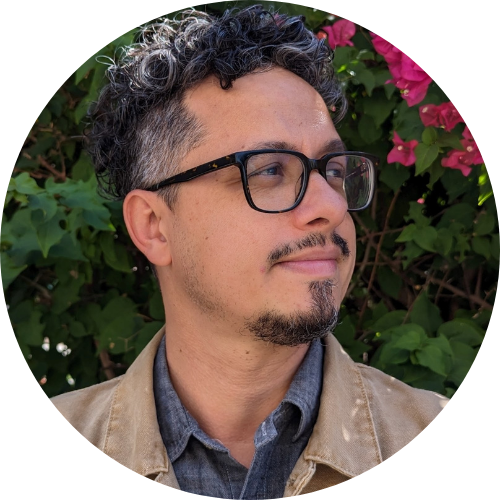
Dr. Roberto de Roock is assistant professor of learning sciences and technology at University of California, Santa Cruz. A former secondary school literature and digital literacy teacher, his research critically examines the nexus of literacy, technological change, and abolition for marginalized students. In particular, he researches and seeks to transform the uptake of digital media in diverse classroom and community ecologies, taking into account the politics of technology and its place within broader material realities of racialization, schooling, and neoliberal discourses of education reform. Primarily he does this through ethnographic design work, but also in pioneering critical digital discourse analysis and participatory methods. He is committed to harnessing technology for abolitionist social transformation, especially through collaborating with marginalized communities.
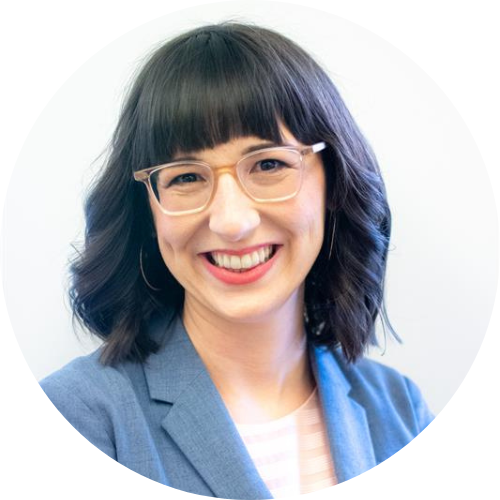
Bethany Monea is an assistant professor of Community Writing at the University of the District of Columbia. She researches and teaches writing and media-making; critical digital literacies; and participatory, arts-based research methods. Her work can be found in Written Communication, Computers and Composition, Kairos, English Journal, and elsewhere.
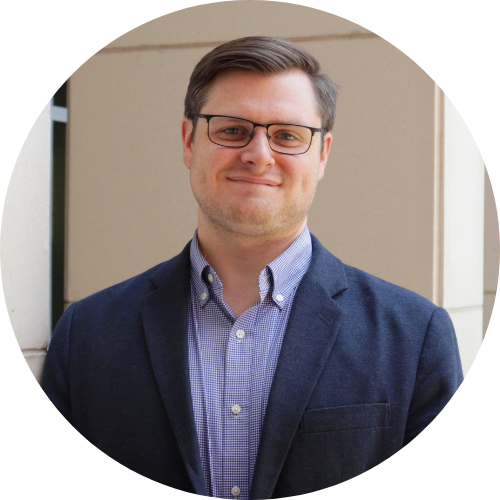
Philip Nichols is an associate professor of literacy education in the Department of Curriculum and Instruction at Baylor University. He studies how science and technology condition the ways we practice, teach, and talk about literacy—and the implications of this conditioning for equitable public education and human flourishing. He is the author of Building the Innovation School: Infrastructures for Equity in Today’s Classrooms (Teachers College Press, 2022) and co-editor, with Antero Garcia, of Literacies in the Platform Society: Histories, Pedagogies, Possibilities (Routledge, forthcoming in 2024). His work appears in research journals, such as Harvard Educational Review, Research in the Teaching of English, and Learning, Media, and Technology, as well as practitioner-oriented journals like English Journal, Phi Delta Kappa, and Educational Leadership. He holds a PhD in literacy, culture, and international education and an MA in history and sociology of science, both from the University of Pennsylvania.
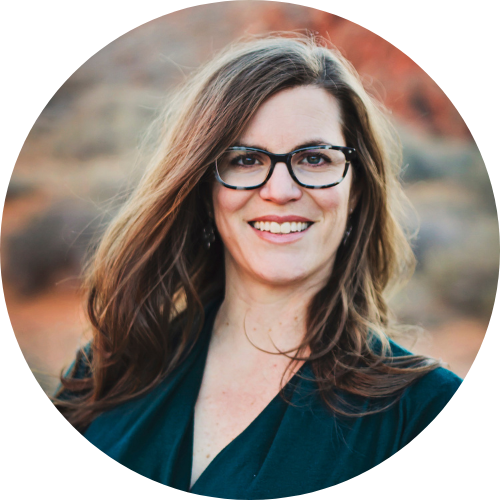
Dr. Anna Smith brings over 25 years of teaching experience and dedication to humanizing learning to research on writing development, transliteracies, and the intersections of teaching, learning, and emerging technologies. She is currently an associate professor at Illinois State University, following an IES Postdoctoral Fellowship in Writing and New Learning Ecologies at University of Illinois, Urbana-Champaign. She is coauthor of Developing Writers: Teaching and Learning in the Digital Age and coeditor of the Handbook of Writing, Literacies, and Education in Digital Cultures. Her recent and award-winning research can be found in journals such as English Journal, Journal of Literacy Research, Pedagogies: An International Journal, Literacy, and Theory into Practice.

Jessica Zacher Pandya is dean and professor in the College of Education at California State University, Dominguez Hills. A former kindergarten teacher in the California Bay Area who earned her PhD at UC Berkeley, her research focuses on children’s literacy and identity work in diverse urban classrooms.
Prior to coming to CSUDH, Pandya served as chair of the Academic Senate (2019–21) and chair of the Liberal Studies Department (2014–20) at CSU Long Beach. Her latest books are Exploring Critical Digital Literacy Practices: Everyday Video in a Dual Language Context (2018) and the coedited Handbook of Critical Literacies (2021).
Leading and Learning: Session #3 based on Culturally Responsive Approaches to the Teaching of Literature in Secondary English Classrooms, a new NCTE Squire Office Brief
Wednesday, July 26, at 4 p.m. ET
“Reading and responding to literature are arguably the most foundational activities of English language arts (ELA) classes in U.S. secondary schools. Even amid recent social, cultural, and political shifts that have prodded literacy education to attend more closely to informational texts and technical aspects of college- and career-focused writing, the practice of grappling with the figurative language and enduring themes of creative works of art remains a touchstone of the middle and high school ELA experience.”
In this session, four of the authors of the NCTE James R. Squire Office policy brief Culturally Responsive Approaches to the Teaching of Literature in Secondary English Classrooms will discuss current issues in the field impacting secondary classrooms and how to apply the brief’s proposed principles when faced with these issues.

Michael Macaluso is an associate teaching professor of English education in the Institute for Educational Initiatives at the University of Notre Dame. The recipient of several teaching awards, including most recently the University’s Edmund P. Joyce Award for Excellence in Undergraduate Teaching, Macaluso teaches a number of education and literacy-related courses to undergraduate and graduate students. His scholarship focuses on critical approaches to teaching and learning in English classrooms, especially around literary instruction, and he is the founder and chair of the University’s Alexandria Award for Young Adult Literature, a new initiative aimed at fostering students’ literacy and faith development. He is a former secondary English teacher and a past president of the Indiana Council of Teachers of English, a state affiliate of NCTE.

Nicole Mirra is an associate professor of urban teacher education in the Department of Learning & Teaching at the Rutgers University Graduate School of Education. She previously taught secondary literacy and debate in Brooklyn, New York, and Los Angeles, California. Her work utilizes participatory design methods in classroom, community, and digital spaces to collaboratively create civic learning environments with youth and educators that disrupt discourses and structures of racial injustice and creatively compose liberatory social futures. Her books include Educating for Empathy: Literacy Learning and Civic Engagement (Teachers College Press, 2018), Doing Youth Participatory Action Research: Transforming Inquiry with Researchers, Educators, and Students (Routledge, 2015), and Civics for the World to Come: Committing to Democracy in Every Classroom (Norton, 2023).

Jodene Morrell is a teaching professor, associate director of the Notre Dame Center for Literacy Education, and advisor in the Education, Schooling and Society program. Dr. Morrell taught third and fourth grade in public schools in Los Angeles, San Francisco, and San Jose, California, and was a middle school literacy specialist in Lansing, Michigan, before earning a doctorate in curriculum, teaching, and educational policy with an emphasis in literacy at Michigan State University. Prior to joining the University of Notre Dame, Dr. Morrell was a senior researcher and senior lecturer at Teachers College, Columbia University, where she advised students in the Literacy Specialist Master’s Program. Her research focuses on literacy pedagogy in K–8 classrooms, the role of multicultural and diverse children’s literature for making literacy and literature engaging and accessible for all students, and teachers as scholars and researchers.

Lisa Scherff began her teaching career in 1996, and after earning her PhD she moved to the college level, working 11 years as a teacher educator at the University of Tennessee, the University of Alabama, and Florida State University. She currently teaches English and AP research at the Community School of Naples. Lisa has served NCTE in numerous capacities, including President of the Alabama Council of Teachers of English, coeditor of English Education, Chair of the Secondary Section Steering Committee, and Chair of the Amelia Elizabeth Walden Book Award. Her research has been published in journals such as Research in the Teaching of English, English Education, and Journal of Literacy Research. Her books include New Directions in Teaching English: Reimagining Teaching, Teacher Education, and Research (2015, coedited with Ernest Morrell) and Teaching YA Lit Through Differentiated Instruction (2010, coauthored with Susan Groenke).

